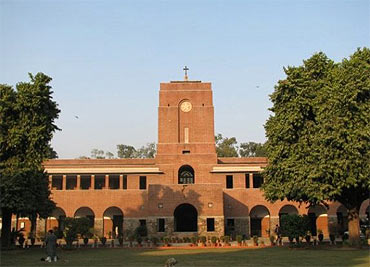 | « Back to article | Print this article |
4 mantras to choose the right course and college
As the batch of 2010-11 is all set to step into colleges and universities, Careers 360 lists out the four things one must keep in mind while taking the next big step.
Selecting a course and college is always the most difficult exercise for any student.
"I spent one year doing engineering and opted out, because my interest was Physics," says Senior Advocate and leading public interest lawyer Prashant Bhushan, who finally settled for law. But very few students have the luxury of time to change course mid way.
So it is imperative that one identifies the right course the first time. Here are some pointers on how to go about.
Illustration: Dominic Xavier
Course vs college
A college education is not only about studies, but also about the opportunities one gets, the peer group one interacts with and life long friendships one can form.
"Old boy network is alive and kicking," says S Rajaram, a media professional and former student of Maharaja's college, Ernakulum.
So irrespective of the place one studies, studying in a reputed college always helps.
Between a college and a course, especially in non-professional programmes the college wins hands down. But do not get into any course, just for the sake of entering a college.
For someone who hates numbers, doing Mathematics even from Delhi's hallowed St Stephen's would not help because he or she will not enjoy the course.
So as far as possible study what you like and what your capabilities allow you.
Says Prof Sanjay Srivastava, a PhD in Psychology and Dy Director General of Amity Business school, "When it comes to selection of a course, it is important to understand what one dislikes and not to do that."
Rest would, of course, fall in line, since interest and passions change over time.
Passion is an abused word
Narayana Murthy was a passionate Marxist and wanted to be a politician. But passion is a transient phenomenon according to Murthy, who eventually went on to become the father figure of Indian software industry.
So unless one is absolutely sure, or one has the natural flair or talent for sports or music, pay more attention to opportunities that are opening up and choose a course that would help you realise them.
For example, communication-related options are plenty now. So, according to Career Counsellor Arun Sarma, courses like English Literature, Journalism and Mass Media are gaining currency. But Dr Dheeraj Sanghi, an architect, warns that interest matters when it comes to professional courses.
One who is not good at tinkering with materials shouldn't opt for mechanical engineering.
Illustration: Uttam Ghosh
Sciences are not superior
Prof Deepak Kumar, a professor of education at JNU, says, "What is important is to aspire for excellence in any domain you choose to study. No subject is implicitly better than the other."
Data on the other hand is in favour of sciences. A recent study published in the magazine US News says that science graduates out-earn humanities by a factor of two. But Humanities too offers a lot of options, especially in fields like communications, management and administration.
Illustration: Uttam Ghosh
Interest does matter
Shirali Tyabji, who recently graduated from Shristi School of Design, on the other hand, says interests do play a role and must not be ignored.
This is true about courses, which demand a modicum of talent, like design, arts, music, film making etc. Unless one has a flair for these domains do not venture into these fields.
But when it comes to Sociology and Economics or English Literature and journalism, one need not be too narrow and a selection based on a combination of potential opportunities and interests must do the trick.
Illustration: Uttam Ghosh




